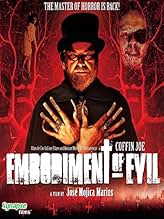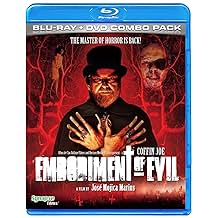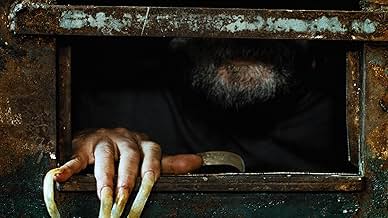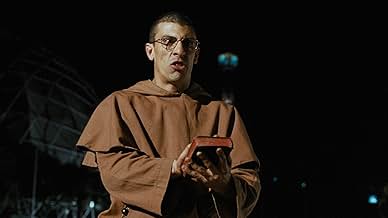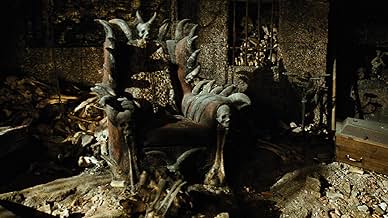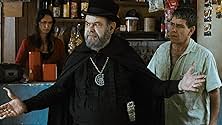AVALIAÇÃO DA IMDb
5,9/10
1,9 mil
SUA AVALIAÇÃO
O coveiro Zé do Caixão continua sua busca pela mulher perfeita para gerar seu filho.O coveiro Zé do Caixão continua sua busca pela mulher perfeita para gerar seu filho.O coveiro Zé do Caixão continua sua busca pela mulher perfeita para gerar seu filho.
- Direção
- Roteiristas
- Artistas
- Prêmios
- 17 vitórias e 9 indicações no total
Rui Resende
- Bruno
- (as Rui Rezende)
Zé Celso
- Mistificador
- (as José Celso Martinez Corrêa)
Cleo de Paris
- Dra. Hilda
- (as Cléo De Páris)
Raymond Castile
- Zé do Caixão jovem
- (as Raymond Castille)
- Direção
- Roteiristas
- Elenco e equipe completos
- Produção, bilheteria e muito mais no IMDbPro
Avaliações em destaque
I've failed poor old Coffin Joe. His movies seem like they would be custom made for my needs: they're low budget, foreign-language movies that have clawed their way to the top of the heap of such flicks based on the strength of their imagery and the indelible presence of the man himself.
The trouble is his movies always lose me. I don't know if it's due to lack of plot, obscure narrative, or poor pacing. I just always lose interest while waiting for something to happen. They have their images, but little else, and this finale to the series is no exception - in fact, with the benefit of a bigger budget, it may have images to trump all the others, including a descent into hell Joe takes which looks like the inside of an intestine, and empties into a legitimately horrifying scene some rather graphic cannibalism.
The film just never took me along for a ride. It's the kind of thing where you keep one eye on the screen, one eye on something else, and wait for an interesting scene. It's missing the glue to link these together.
The trouble is his movies always lose me. I don't know if it's due to lack of plot, obscure narrative, or poor pacing. I just always lose interest while waiting for something to happen. They have their images, but little else, and this finale to the series is no exception - in fact, with the benefit of a bigger budget, it may have images to trump all the others, including a descent into hell Joe takes which looks like the inside of an intestine, and empties into a legitimately horrifying scene some rather graphic cannibalism.
The film just never took me along for a ride. It's the kind of thing where you keep one eye on the screen, one eye on something else, and wait for an interesting scene. It's missing the glue to link these together.
"Nails grow even after death."
I wholeheartedly enjoyed the previous two installments of the Coffin Joe Trilogy, so I felt obliged to watch this one as well. The film takes place forty years after the previous one, when Coffin Joe is finally released from prison. Upon release, his goals are the same: kill petty humans and create the perfect offspring.
Even after all this time, José Mojica Marins remains true to his original films. Despite the serious gap of time between the last two films, Embodiment of Evil maintains the same style as his other ones and has a classic cult horror type of vibe. The writing is wonderfully disturbing, and this film strengthens Coffin Joe's character, something I didn't expect.
On the other hand, I feel the franchise itself was damaged with this. It relies on the success of the other two movies to drive it forward, as we see Coffin Joe repeatedly haunted by the black-and-white ghosts of his past. Embodiment of Evil hardly lives up to the mastery of the previous two installments, though it tries very hard. There's a purgatory scene that's okay, but it hardly compares to the hell scene in This Night I'll Possess Your Corpse. There's also a straight twenty minutes of torture porn which doesn't seem to fit well with the rest of the trilogy.
In comparison to the other two, this one is definitely the weakest. Embodiment of Evil has some good moments, and it's a worthwhile watch to round out the trilogy. That said, it relies too much on the grotesque and not enough on the main character that defined the originals.
I wholeheartedly enjoyed the previous two installments of the Coffin Joe Trilogy, so I felt obliged to watch this one as well. The film takes place forty years after the previous one, when Coffin Joe is finally released from prison. Upon release, his goals are the same: kill petty humans and create the perfect offspring.
Even after all this time, José Mojica Marins remains true to his original films. Despite the serious gap of time between the last two films, Embodiment of Evil maintains the same style as his other ones and has a classic cult horror type of vibe. The writing is wonderfully disturbing, and this film strengthens Coffin Joe's character, something I didn't expect.
On the other hand, I feel the franchise itself was damaged with this. It relies on the success of the other two movies to drive it forward, as we see Coffin Joe repeatedly haunted by the black-and-white ghosts of his past. Embodiment of Evil hardly lives up to the mastery of the previous two installments, though it tries very hard. There's a purgatory scene that's okay, but it hardly compares to the hell scene in This Night I'll Possess Your Corpse. There's also a straight twenty minutes of torture porn which doesn't seem to fit well with the rest of the trilogy.
In comparison to the other two, this one is definitely the weakest. Embodiment of Evil has some good moments, and it's a worthwhile watch to round out the trilogy. That said, it relies too much on the grotesque and not enough on the main character that defined the originals.
I was at the Canadian Premiere of Embodiment of Evil during Montreal's Fantasia Film Festival. The introduction alone was worth the price of admission as the co-screenwriter Dennison Ramalho, dressed in a leather straight-jacket, introduced the director and star, Coffin Joe himself, José Mojica Marins, who was wheeled onstage by three gorgeous, fetish-wearing goths in a shroud covered container that was unveiled to be an open coffin.
Embodiment of Evil is the third in the Coffin Joe trilogy, the first two films being À Meia-Noite Levarei Sua Alma (1964)... aka At Midnight I'll Take Your Soul and Esta Noite Encarnarei no Teu Cadáver (1967)... aka This Night I Will Possess Your Corpse.
Zé do Caixão, the Coffin Joe character is a combination of showy horror host, comic-book magician (specifically Mandrake the Magician) and depraved, sadistic serial torturer and murderer. A gravedigger, he wears a top hat, black cloak and has supernaturally long fingernails. A fierce atheist who denies the existence of both Heaven and Hell, Coffin Joe is obsessed by his search of the perfect woman with whom he can mate and continue his bloodline, preserving his eternal blood in a son. Joe's definition of a perfect woman is one that, like him, has no fear. To identify her, Joe uses the most diabolical tortures possible and those who fail his tests die in the most hideous and painful manner possible.
Fantasia programmed the two previous Coffin Joe films back in 1999 and brought José Mojica Marins from Brazil to present them. While by no means the only people who can take credit, the Fantasia team must share the blame for reintroducing the world to Zé do Caixão.
I am not a fan of torture in horror films. What makes the Coffin Joe films palatable to me is the barely veiled metaphor of Coffin Joe trying to free Brazil from its imprisonment - chained by fear of violence from the military dictatorship and superstitious fear of the Roman Catholic Church. Nothing that Coffin Joe did or could do could ever be as evil or perverse as the way that the Junta and the church conspired to enslave Brazil and Brazilians. Coffin Joe is like a Pied Piper for freedom, offering a path filled with pain and for many, death, but promising at the end of the road a freedom that neither government nor church can take away.
Embodiment of Evil begins with Coffin Joe being released from an insane asylum where he has been confined for the last 40 years after his crimes in the first two films. (Amusingly, his hunchback assistant Bruno has been waiting for him for all these years.) Coffin Joe exits to a world both completely different from the one that he left and eternally the same. There is very much a sense that Coffin Joe is a man from a time that has past while simultaneously a prophet whose time has come.
Coffin Joe's quest is both easier and more difficult than it was in the past. Easier because he now has disciples, the children and grand-children of those who heard his message in the sixties. And a new generation of women unshackled by fear gives Coffin Joe an embarrassment of choice to be his perfect woman.
His quest is more difficult because the barriers of fear and superstition still exist. The metaphor still works: fear of a violent military has been replaced by the fear of a corrupt and violent police. The superstitious fear of the church remains although its grip has weakened. The biggest change is that everyone is haunted by the sins of the past. The new Brazil is built on the bones and blood of the old Brazil and everyone (including Coffin Joe) is haunted by the ghosts of that past.
For Joe, this is a revolting development. As a man whose entire life is built on a denial of the existence of a life after death, ghosts are an abomination. Coffin Joe works even better as a metaphor for the new Brazil, futilely denying its' bloody past, like Lady Macbeth trying desperately to wash away the bloody spot.
Embodiment of Evil, like all the films in the Coffin Joe trilogy, is not a film for the squeamish. The images of pain and torture are all the more horrific since many of them are real. (Apparently for many in the Brazilian fetish community, being tortured by Coffin Joe is a badge of honour.) What can't be denied is that his vision is a unique vision of horror that speaks to those who will listen as clearly today as it did in the sixties.
Embodiment of Evil is the third in the Coffin Joe trilogy, the first two films being À Meia-Noite Levarei Sua Alma (1964)... aka At Midnight I'll Take Your Soul and Esta Noite Encarnarei no Teu Cadáver (1967)... aka This Night I Will Possess Your Corpse.
Zé do Caixão, the Coffin Joe character is a combination of showy horror host, comic-book magician (specifically Mandrake the Magician) and depraved, sadistic serial torturer and murderer. A gravedigger, he wears a top hat, black cloak and has supernaturally long fingernails. A fierce atheist who denies the existence of both Heaven and Hell, Coffin Joe is obsessed by his search of the perfect woman with whom he can mate and continue his bloodline, preserving his eternal blood in a son. Joe's definition of a perfect woman is one that, like him, has no fear. To identify her, Joe uses the most diabolical tortures possible and those who fail his tests die in the most hideous and painful manner possible.
Fantasia programmed the two previous Coffin Joe films back in 1999 and brought José Mojica Marins from Brazil to present them. While by no means the only people who can take credit, the Fantasia team must share the blame for reintroducing the world to Zé do Caixão.
I am not a fan of torture in horror films. What makes the Coffin Joe films palatable to me is the barely veiled metaphor of Coffin Joe trying to free Brazil from its imprisonment - chained by fear of violence from the military dictatorship and superstitious fear of the Roman Catholic Church. Nothing that Coffin Joe did or could do could ever be as evil or perverse as the way that the Junta and the church conspired to enslave Brazil and Brazilians. Coffin Joe is like a Pied Piper for freedom, offering a path filled with pain and for many, death, but promising at the end of the road a freedom that neither government nor church can take away.
Embodiment of Evil begins with Coffin Joe being released from an insane asylum where he has been confined for the last 40 years after his crimes in the first two films. (Amusingly, his hunchback assistant Bruno has been waiting for him for all these years.) Coffin Joe exits to a world both completely different from the one that he left and eternally the same. There is very much a sense that Coffin Joe is a man from a time that has past while simultaneously a prophet whose time has come.
Coffin Joe's quest is both easier and more difficult than it was in the past. Easier because he now has disciples, the children and grand-children of those who heard his message in the sixties. And a new generation of women unshackled by fear gives Coffin Joe an embarrassment of choice to be his perfect woman.
His quest is more difficult because the barriers of fear and superstition still exist. The metaphor still works: fear of a violent military has been replaced by the fear of a corrupt and violent police. The superstitious fear of the church remains although its grip has weakened. The biggest change is that everyone is haunted by the sins of the past. The new Brazil is built on the bones and blood of the old Brazil and everyone (including Coffin Joe) is haunted by the ghosts of that past.
For Joe, this is a revolting development. As a man whose entire life is built on a denial of the existence of a life after death, ghosts are an abomination. Coffin Joe works even better as a metaphor for the new Brazil, futilely denying its' bloody past, like Lady Macbeth trying desperately to wash away the bloody spot.
Embodiment of Evil, like all the films in the Coffin Joe trilogy, is not a film for the squeamish. The images of pain and torture are all the more horrific since many of them are real. (Apparently for many in the Brazilian fetish community, being tortured by Coffin Joe is a badge of honour.) What can't be denied is that his vision is a unique vision of horror that speaks to those who will listen as clearly today as it did in the sixties.
Released after 40 years of imprisonment, Coffin Joe (Jose Mojica Marins), with the help of his faithful henchman, Bruno, returns to his quest for immortality through an abominable offspring. This time, Joe and a small band of dedicated followers must battle a wicked police force, a maniacal priest, and a pair of blind witches! Not surprisingly, much bloodletting, nudity, and hideous death ensue. Will Joe finally get what he desires / deserves?
EMBODIMENT OF EVIL sums up everything, culminating in a carnival house of horrors. Marins pulls out all the bloody stoppers, making Coffin Joe a true figure of pure eeevil! A final, unspeakable triumph...
EMBODIMENT OF EVIL sums up everything, culminating in a carnival house of horrors. Marins pulls out all the bloody stoppers, making Coffin Joe a true figure of pure eeevil! A final, unspeakable triumph...
I must confess to not having seen the first two installments of this Brazilian cult series (At Midnight I'll Take Your Soul & This Night I Will Possess Your Corpse). I tried renting them in Brazil, but couldn't find them.
Still, the movie is definitely fun to watch, even without prior knowledge of the story of Josefel Zanatas, the undertaker also known as Zé do Caixão (Coffin Joe).
Without giving much away, Zé do Caixão is obsessed with having a perfect son, born to a perfect woman, which he likes to refer to as "the continuation of the blood". He is also a hard-core atheist and sadist.
I personally think that Zé's atheism is one of the most interesting facets of this movie. Instead of slipping through the easy path of satanism, Zanatas (almost an anagram of Satanás, Satan in Portuguese) remains a down-to-the-bone atheist, even when confronted with visions of hell and of past victims of his sadist rites. It is this that gives him his alleged superiority. He is free, as he puts it himself. Free of all belief in false (theist) morals.
This if of course a trash movie, though with much larger budget than his previous work, so one should not expect to see Hollywoodesque special effects. Yet Mr. Marins creativity is still captivating, and delivers marvelous scenes, such as that of a naked woman leaving a dead pig carcass (no special effects here, it was a true pig). Humor is also very present, and at some scenes even very experienced actors have a hard time concealing a smile.
All in all, 7 out of 10. But if you are only concerned with having fun, this movie is a 10 out of 10.
Still, the movie is definitely fun to watch, even without prior knowledge of the story of Josefel Zanatas, the undertaker also known as Zé do Caixão (Coffin Joe).
Without giving much away, Zé do Caixão is obsessed with having a perfect son, born to a perfect woman, which he likes to refer to as "the continuation of the blood". He is also a hard-core atheist and sadist.
I personally think that Zé's atheism is one of the most interesting facets of this movie. Instead of slipping through the easy path of satanism, Zanatas (almost an anagram of Satanás, Satan in Portuguese) remains a down-to-the-bone atheist, even when confronted with visions of hell and of past victims of his sadist rites. It is this that gives him his alleged superiority. He is free, as he puts it himself. Free of all belief in false (theist) morals.
This if of course a trash movie, though with much larger budget than his previous work, so one should not expect to see Hollywoodesque special effects. Yet Mr. Marins creativity is still captivating, and delivers marvelous scenes, such as that of a naked woman leaving a dead pig carcass (no special effects here, it was a true pig). Humor is also very present, and at some scenes even very experienced actors have a hard time concealing a smile.
All in all, 7 out of 10. But if you are only concerned with having fun, this movie is a 10 out of 10.
Você sabia?
- CuriosidadesThis film held until 2023 the record for the longest gap between the film and the sequel with at least one actor returning as the same character in 41 years. The new record has The Exorcist: Believer in which Ellen Burstyn repeated her character 50 years after the original film.
- Citações
[from trailer]
Coffin Joe: Pictures don't die, captain!
- ConexõesEdited into VBS Meets: Coffin Joe (2009)
Principais escolhas
Faça login para avaliar e ver a lista de recomendações personalizadas
Detalhes
Bilheteria
- Faturamento bruto mundial
- US$ 91.780
- Tempo de duração
- 1 h 34 min(94 min)
- Cor
- Mixagem de som
- Proporção
- 1.85 : 1
Contribua para esta página
Sugerir uma alteração ou adicionar conteúdo ausente

